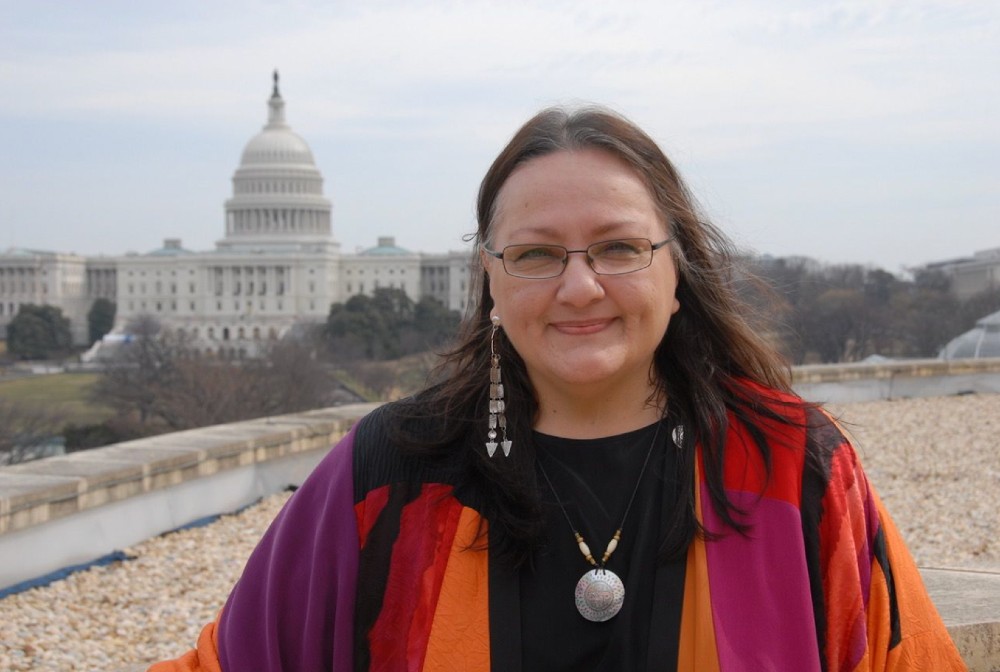
- Details
- By Levi Rickert
Opinion. This past Wednesday, the Washington National Football League (NFL) franchise became the Washington Commanders. The name replaces the racist moniker the team used from its time in Boston in 1933 until the team relinquished it in July 2020.
While the new name was revealed Wednesday, the team agreed on July 2, 2020 to drop the offensive name despite franchise owner Dan Snyder saying in 2013, “We’ll never change the name. It’s that simple. NEVER - you can use caps.”
Well, NEVER came seven years later.
Want more Native News? Get the free daily newsletter today.
The shift occurred in the aftermath of the George Floyd murder. Corporate America put pressure on Snyder to drop the racial slur. Pressure mounted when Rep. Alexandria Ocasio-Cortez (D-NY) and Washington D.C. Mayor Muriel Bowser (D) said it was time to change the name.
On “#BlackoutTuesday,” which was called to draw attention to racial injustice in the aftermath of George Floyd’s death at the hands of Minneapolis police officers, Ocasio-Cortez noticed the Washington NFL team blackened its Twitter logo to support Black Lives Matter.
“Want to really stand for racial justice? Change your name,” Ocasio-Cortez wrote in response on Twitter.
Mayor Bowser was asked about Ocasio-Cortez’s comments on a DC radio talk show.
“I think it’s past time for the team to deal with [it. The team name, Redsk!ns] offends so many people,” Bowser said on the radio show. “This is a great franchise with a great history, that’s beloved in history and it deserves a name that reflects the affection that we feel for the team.”
Efforts from corporate America and politicians are important, but Native Americans’ calls for the team to drop its name should not be forgotten. That includes calls from Presidential Medal of Freedom recipient Suzan Shown Harjo Harjo (Cheyenne & Hodulgee Muscogee), the late Clyde Bellecourt (White Earth Ojibwe), and Native activist Amanda Blackhorse (Navajo), among others.
On Wednesday, Harjo told Native News Online reporter Darren Thompson:
“The name could be commander, or salamander, or macaroni. It’s not the name that matters, as long as it’s not doing harm and injury to living people—that’s all we ever asked for.”
She is right. It doesn’t matter what sports teams call themselves as long as they leave Native people alone.
Thompson’s article prompted one Native News Online reader to make this comment in an email:
“We have had it with the PC/Woke culture eliminating the Cleveland Indians, the Fighting Sioux, the Ole Rebels, the Fighting Christians, the Red Men, the Fighting Illini, the Plainsmen, the Hurons, etc.”
Then he asked: “Why are people like you and others so offended at these mascots? It almost seems that you are against diversity and history when it comes to this.”
What the reader doesn’t live with as a non-Native person is the dishonor that goes with teams using Native names and themes. There is no honor when a fans’ faces are painted, heads decorated with turkey feathers or when opposing teams fans chant: “Scalp the Redsk!ns!” There is no honor in either scenario for Native Americans.
Our opposition to Native-themed mascots is simple. They don’t honor Native Americans. They dehumanize Native Americans. The basis for this opposition goes beyond the racist nature of mascots, according to the Reclaiming Native Truth report, released in June 2018.
“Research shows that these mascots are damaging to Native high school and college students, negatively impacting feelings of personal and community worth, and that they reinforce bias among non-Native people,” per the Reclaiming Native Truth Project.
The timing of Wednesday’s announcement on Groundhog Dog was noticed by American Indian College President and CEO of the American Indian College Fund Cheryl Crazy Bull (Sicangu Lakota) who stated, “I can’t think of a better metaphor for the need for respectful visibility of Native people in America than the Washington football team’s announcement that it changed its name to the Commanders, on Groundhog Day.”
Like the movie protagonist stuck in a time warp where every day is the same day and events repeat themselves, the same is true in Indian Country where more work needs to be done to eradicate racist mascots and names, day in and day out.
It will never be acceptable, respectful or honorable to use Native American names and imagery to name sports teams. And today, as America reckons with its racist history, it’s a small yet significant step towards achieving reconciliation. The remaining disgraceful professional sports teams holding on to their Native-themed names must shed this racist practice and follow suit.
More Stories Like This
Disrupting Poverty Through OpportunitySanctuary Cities Under Siege: When Federal Power Becomes a Weapon Against the People
Denmark's Genocidal Practices in Greenland
Cherokee Nation Stands Against Predatory Lending
Tribes Seek Better Data, Real Accountability in MMIP Cases Ahead of Tribal Consultation
Help us defend tribal sovereignty.
At Native News Online, our mission is rooted in telling the stories that strengthen sovereignty and uplift Indigenous voices — not just at year’s end, but every single day.
Because of your generosity last year, we were able to keep our reporters on the ground in tribal communities, at national gatherings and in the halls of Congress — covering the issues that matter most to Indian Country: sovereignty, culture, education, health and economic opportunity.
That support sustained us through a tough year in 2025. Now, as we look to the year ahead, we need your help right now to ensure warrior journalism remains strong — reporting that defends tribal sovereignty, amplifies Native truth, and holds power accountable.
 The stakes couldn't be higher. Your support keeps Native voices heard, Native stories told and Native sovereignty defended.
The stakes couldn't be higher. Your support keeps Native voices heard, Native stories told and Native sovereignty defended.
Stand with Warrior Journalism today.
Levi Rickert (Potawatomi), Editor & Publisher

